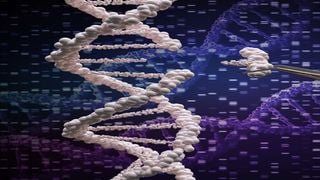Breaking: Autopsy reveals how Cyrus Jirongo died

Africa
Premium
Uptick of DNA tests in Nigeria exposes family secrets
On Monday on Nigerian Twitter, a man curiously named 'Born Gifted' ignited conversation on the platform after claiming that his uncle had, belatedly, found out that two of ‘his’ three children were not biologically his.
About a week ago, a High Court judge in Delta State, Justice Anthony Okorodas, revealed to the world that he had recently discovered that three children he had with his ex wife, lawyer Celia Juliet Ototo, were not biologically his.
Justice Okorodads and Ms Ototo had parted ways 11 years ago. According to him, via a press statement released on January 28, 2021, his curiosity was piqued after an anonymous caller tipped him off by claiming the last born was not his. However, tests on all three confirmed the shocking truth, he said.
"Consequently, I convened a joint meeting between my extended family on the one side, and Celia’s paternal and maternal families (i.e., the Ototo Family of Ovom Town and the Agbagidi Family of Yenagoa Town) on the other side, where I confronted her with the paternity fraud allegation. Although she initially strongly insisted that I was the biological father, she has since confessed to having the child with another man during the course of our marriage...This abomination has caused excruciating mental trauma to me, my present wife, Barrister (Mrs) Ebi Okorodas and all of the innocent children involved," he explained.
The DNA test results came out in September, he said. One of the children was only six when the marriage ended. The judge had been raising the children with his new wife and reportedly financially catered for everything, including their education.
More common
Such revelations are becoming more common in Nigeria as DNA testing technology, despite being expensive, is now more widely available.
A familiar saying in the country, that only a woman knows the father of her child, is ringing true for some.
For instance, Mr Tunde Thomas, a 45-year-old Nigerian, died recently after his wife, Moyo Thomas, informed him that their two children were sired by her boss at the First City Monument Bank.
Once the news broke on January 1, 2020, the Managing Director of the Bank, Mr Adam Nuru, denied having romantic affairs with his staff.
Mr Tunde is said to have been traumatised after realising the two children, which he had all along thought were his, were fathered by his wife’s boss. He died on December 16 but the case intensified after the bank manager chose to react to online rumours about him.
Head of State
Four years ago, a case involving 86-year-old Nigeria’s former military Head of State, Gen Yakubu Gowon, became fodder for the media.

Nigeria’s former military Head of State, Gen Yakubu Gowon.
In the paternity tussle that was settled in March 2016, Gowon accepted fathering a child born outside wedlock with the late public relations expert, Princess Edith Ike Okongwu, bringing to an end the 48-year-old paternity dispute over Mr Musa Gowon.
Mr Musa, who spent about 23 years in a United States prison, returned to Nigeria late last year after he was acknowledged by Gen Gowon following a conclusive DNA test.
The paternity dispute was the subject of a legal suit that reached the Supreme Court in Nigeria, which Gowon’s ex-lover won. In acknowledging Musa as his son in a statement, Mr Gowon, who prosecuted Nigeria’s civil war of 1967 to 1970, said: “Following years of doubts and speculation, a DNA test was recently conducted to ascertain the paternity of Musa Gowon, who recently returned to the country.
“The results of the tests were conclusive, and they confirm my paternity. We, the family, are working to assist in his rehabilitation following a very difficult period in his life. As we look forward to the future with faith in God, we request that our privacy be respected.”
Paternity testing
Many of these cases in Nigeria involve couples who have fallen out, so it may be difficult to determine just how many men have raised children they thought were theirs.
But thanks to technology, DNA (Deoxyribonucleic Acid) paternity testing has become possible. It uses what scientists call genetic fingerprinting to determine whether a man and a child or children are biologically related.
The test can also determine the likelihood of someone being a biological grandparent of a child. Experts say DNA testing is the most accurate way of ascertaining paternity.
According to Dr Ayodele Adeniyi, the Chief Executive Officer of Paternity Test Nigeria, many people in the country would want to confirm the paternity of their children but are restrained by the high cost of DNA tests. The test can go for as high as $600.
However, he has advice for anyone planning to go down this road.
“Don't start what you can't finish. Before indulging in a DNA test, you should make sure you are mentally, physically and psychologically okay to withstand the results. You should always prepare for the worst, because if you die in the process, you still lose,” he said.
Nigerian courts are inundated with paternity cases, which many times involve DNA tests. The cases, however, remain undecided because of the high cost of the test.
Mr Kazeem Ayanwale, CEO of Safe Family Home, a Nigerian non-profit child rights organisation, said the late discovery of child paternity had sent some men to their early graves, and had exposed others to lifelong disgrace.
“How does one explain a situation where a man who believes he has four children is later told he isn't the father of any of them? Where do you expect such a man to start from?”
Arguing for reduction in the price of a DNA test, he said: “If the test is cheap, it can be done as early as possible, for any man that suspects his wife.’’
Dr Helen Obi, Vice Chairperson, Federation of International Women Lawyers (FIDA) Anambra chapter, has attributed high rate of paternity fraud to the abuse and abandonment women experience in marriages.
Dr Obi, an expert in Family Law, said on February 9, 2021 that, although there is no legal punishment for paternity fraud, it is largely to high level of abuse, abandonment and second-class treatment most women endured in their various marriages.
“Women most times do not want to get divorce but only in extreme cases where their lives are endangered,” she said.
She advised couples to adopt a more cooperative approach, invest in love and an all-inclusive marriage, to avoid paternity fraud.





